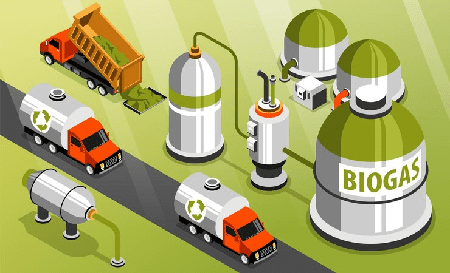ISO/DTR 23585 is a Technical Report developed by the International Organization for Standardization (ISO). This report provides guidelines for safety and environmental considerations in the design, construction, operation, and maintenance of biogas plants. Biogas plants are facilities that utilize biological processes to convert organic materials into biogas, typically methane and carbon dioxide, through anaerobic digestion. […]
A biogas plant, also known as a biogas digester or anaerobic digestion plant, is a facility that converts organic materials such as agricultural waste, food scraps, animal manure, and sewage into biogas through a process called anaerobic digestion. Biogas is a mixture of primarily methane and carbon dioxide, along with small amounts of other gases […]
BIFMA stands for the Business and Institutional Furniture Manufacturers Association. They provide industry standards and certifications for furniture, particularly for commercial and institutional use. A BIFMA certificate for furniture indicates that the product has met certain standards for safety, durability, and sustainability. It assures buyers that the furniture has undergone testing and meets the criteria […]
“Total Quality Management” (TQM) is a management philosophy that focuses on continuous improvement of processes and products or services to achieve customer satisfaction. While TQM has been widely implemented and has proven beneficial in many contexts, there are several approaches and philosophies that organizations can adopt to further enhance their operations and outcomes. Here are […]
The best public transport in India can vary depending on the city or region you’re in, as infrastructure and services differ across the country. However, some commonly regarded efficient modes of public transport in India include: Overall, the best public transport option in India depends on factors such as the city you’re in, your destination, […]
PAS 2060 is a specification developed by the British Standards Institution (BSI) that outlines the requirements for achieving and demonstrating carbon neutrality. Carbon neutrality refers to achieving a state where the net greenhouse gas emissions associated with a product, service, or organization are balanced out by either removing or offsetting an equivalent amount of greenhouse […]
Security inspection machines, such as X-ray scanners, metal detectors, and explosive trace detectors, play a crucial role in ensuring safety and security in various environments, including airports, government buildings, and public events. Certification services for these machines typically involve assessing their compliance with industry standards and regulations to verify their effectiveness and reliability in detecting […]
An energy audit is a systematic review and analysis of energy use within a building, facility, or industrial process. The purpose of an energy audit is to identify opportunities for energy efficiency improvements and cost savings. It typically involves the following steps: Energy audits can be conducted by trained professionals or by internal energy management […]
A Lead Auditor Training on ISO 45001:2018 typically covers the necessary skills and knowledge required to effectively audit an Occupational Health and Safety Management System (OHSMS) based on the ISO 45001 standard. Here’s a general outline of what you might expect over the course of 5 days: Day 1: Introduction to ISO 45001:2018 Day 2: […]
LA 22001 refers to the standard ISO/IEC 22001:2018, which specifies requirements for a food safety management system (FSMS) in the food chain. Training on this standard typically involves understanding the requirements of ISO 22001 and how to implement them effectively within an organization. Here’s a possible breakdown of a 5-day training program on ISO 22001 […]










